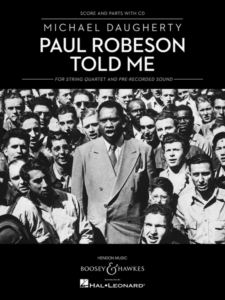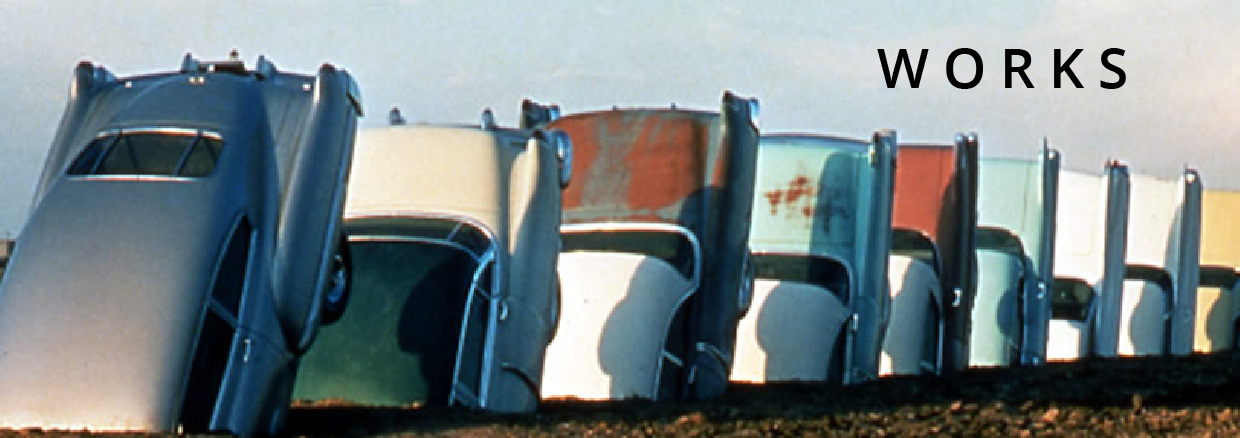Paul Robeson Told Me
for string quartet and tape (1994)
Instrumentation: String quartet and tape
Publisher: Boosey and Hawkes, Hendon Music (BMI)
Duration: 8 minutes

Program Note:
Paul Robeson Told Me (1994) was commissioned by the Smith Quartet for the 1994 Bath Festival for this year’s theme “Ancient Voices.” The great black American Paul Robeson (1898-1976) was perhaps the most passionately outspoken advocate of American racial equality in his time. Although trained as a lawyer, Robeson was widely admired for his acting, on stage as Shakespeare’s Othello and in films such as The Emperor Jones (1932) and Showboat (1936), and in concert as a singer of black American spirituals. At the height of his career, in the 1940s, he devoted his energy to the National Negro Congress and labor unions, using his international celebrity to openly criticize the Ku Klux Klan and segregations laws around the world. Fluent in many languages, Robeson believed that the pre-Stalin philosphy of the Soviet Union would improve the condition of all oppressed people. He was kept under close surveillance by J. Edgar Hoover and the F.B.I. because of “subversive” acts like singing Communist songs alongside “Old Man River” in concerts. His passport was revoked from 1950 to 1958, forcing his film and concert career to a virtual standstill. In 1958 he revived his musical activities abroad, but illness forced him into early retirement.
After composing two works for string quartet and tape for the Kronos Quartet, Sing Sing: J. Edgar Hoover (1992) and Elvis Everywhere (1993), Daugherty chose Paul Robeson as subject for the Smith Quartet commission because “like Elvis Presley, Paul Robeson is an enduring American icon. Both were self-taught singers with a distinctive voice and both were considered “subversive” influences by J. Edgar Hoover, who monitored their activities for his secret files at the F.B.I. The insurgency of Robeson’s voice interests me—its powerful energy—and I want to explore its timbral possibilities as well as its political implications and ambiguities within American culture.”
Paul Robeson Told Me, for string quartet and digital tape, is 10 minutes in duration and divided into two movements performed without pause. The tape part composed by Daugherty as part of the first movement contains segments of an extremely rare concert rendition of the “People’s Battle Song,” sung by Robeson in the summer of 1949 in Moscow, during a concert tour of the Soviet Union to celebrate the 150th anniversary of Pushkin’s birth. The string quartet augments the voice and orchestral accompaniment on the tape, and also introduces original thematic material composed by Daugherty.
The tape part of the first movement is in Russian, and translated into English as follows:
Announcer: The well-known Negro singer and public figure, Paul Robeson, performed with great success at concerts in Moscow…Paul Robeson…Paul Robeson…Paul Robeson…Paul Robeson.
Robeson : (Singing to audience)
From end to end, from sea to sea, he marches, he marches,
Ready for sorrow, ready for suffering, ready for deathly battle.
(Speaking to audience)
They are good young folk,
Who will transform life in their own way,
And will become true human beings.
I am a firm deep friend of the Soviet people.
(Singing…)
Ready for sorrow, ready for suffering, ready for deathly battle.
(Speaking…)
They are good young folk,
Who will transform life in their own way,
And will become true human beings.
I am a firm deep friend of the Soviet people.
I will always be!
(Singing…)
Ready for sorrow, ready for suffering, ready for deathly battle.
Translation by Natalie Challis
The second movement begins without pause after Robeson completes the “People’s Battle Song.” The buoyancy of this movement reflects the visionary optimism of the Harlem Renaissance, in which Robeson was a central figure. Daugherty’s themes woven into the first movement are furiously repeated and composed into a lively rhythmic network: a showpiece for the string quartet, with vibrant syncopations and fearless fiddling in response to the dynamism of Robeson’s voice.
